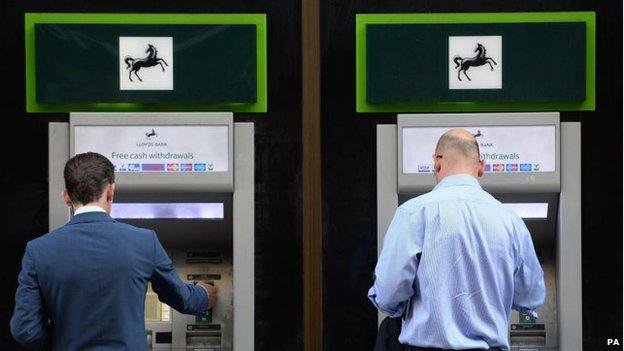Lloyds Banking Group to resume dividend payments
- Published

Lloyds Banking Group has confirmed that it will resume paying dividends to shareholders for the first time since the financial crisis in 2008.
The announcement came as it reported full-year statutory profits of £1.8bn., external
Lloyds is now 23.9% state-owned after the government sold another parcel of shares in the bank earlier this week, raising £500m.
The government's stake had been as high as 41% when it ploughed in £20bn to prop the bank up in 2008.
Lloyds said it would pay a dividend of 0.75 pence per share, amounting to £535m to be split among the bank's three million shareholders.
The largest share, £130m, will go to the government.
The bank added that it had made a further £700m provision in the fourth quarter to settle cases arising from mis-sold payment protection insurance (PPI), bringing the total set aside for the year to £2.2bn.
It also made a £925m provision for other regulatory matters during the year, including £150m to cover the mis-selling of interest rate hedging products to small and medium-sized businesses.
Lloyds' profit for the year represents a big improvement on its performance in 2013, when it made £415m.
Following the announcement, the bank's shares closed up 0.6%.
Incentive plan
The bank said it would be paying out discretionary annual bonuses worth £369.5m for 2014.
Lloyds Chief Executive Antonio Horta-Osorio declined to say whether he thought he was worth his £11m pay package
Its chief executive, Antonio Horta-Osorio, is set to receive a total remuneration package of £11m, consisting of basic pay of £1m, an £800,000 bonus and the payout of a three-year long-term incentive plan, which gives him 535,083 shares.
BBC business editor Kamal Ahmed says there will be controversy over the level of Mr Horta-Osorio's pay, particularly the share plan, which was agreed by the government in 2012 and completes, or "vests", this year.
Our editor points out that because Lloyds' share price has risen so rapidly on the back of the bank's successful turnaround, the shares that the chief executive will receive are much more valuable: 78p each, as against 35p in 2008.
He has been told that Mr Horta-Osorio will pledge not to cash in any of those shares until the government has "substantially" sold the rest of its stake and the taxpayer has been paid back the money used to bail out the bank.
Mr Horta-Osorio told our business editor that he was "really pleased" his bank had resumed dividend payments.
"We went from a very, very negative position in terms of profitability to a position where we generated £7.8bn of underlying profitability [and] we generated £1.8bn of pre-tax profit," he added.
Banking analyst Alex Potter told BBC Radio 5 live's Wake Up to Money that the resumption of dividend payments indicated that Lloyds had returned to health.
"Actually, an awful lot of [investment] funds haven't been able to buy Lloyds shares at all while they haven't been paying a dividend, so actually, just the allowance of those potential shareholders on to the [share] register again is going to be a pretty good thing," he said.
'Progress is possible'
Richard Hunter, head of equities at Hargreaves Lansdown stockbrokers, described Lloyds' results as "something of a breath of fresh air".
He described the return to a dividend payment as "a sign of confidence in future prospects", although the new PPI provision was "somewhat disappointing".
"Nonetheless, the bank is riding the wave of a resurgent UK economy and, along with its own measures to improve metrics across the board, the market consensus of the shares as a buy has been vindicated by these numbers," he added.
John Cridland, director general of employers' organisation the CBI, said: "It is encouraging to hear some good news from the banking sector. All of our major banks are on difficult turnaround journeys and Lloyds have shown that progress is possible.
"It is right in these circumstances that the hard work of staff is recognised. The CBI has been clear that rewards for failure are unacceptable, but legitimate financial rewards for success should not be vilified."